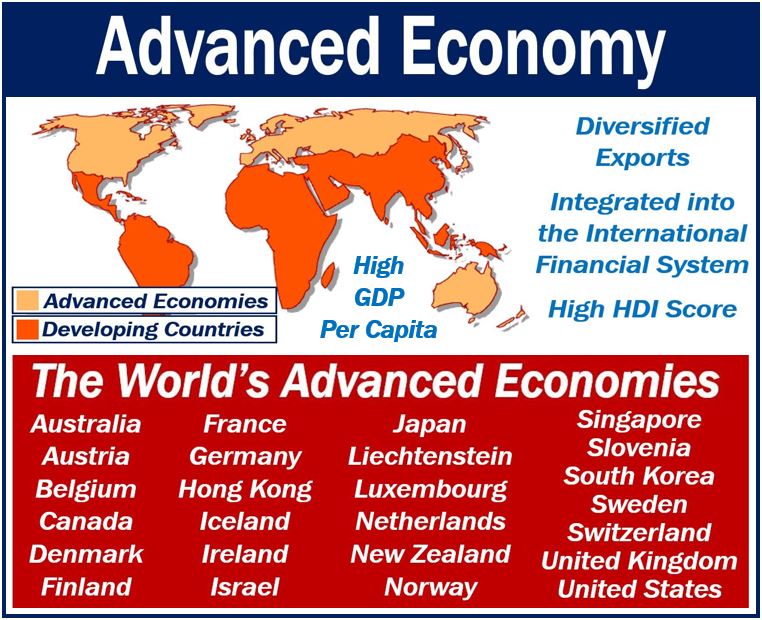An advanced economy is a country whose economy is more developed than those of less industrialized nations. An advanced economy has an advanced technological infrastructure. We also use the terms developed country, industrialized country, and more economically developed country (MEDC).
An advanced economy has a relatively high GDP per capita. GDP per capita equals a country’s total GDP divided by its population. ‘Per capita’ means ‘per head.’ GDP stands for gross domestic product. Gross domestic product equals everything a country produces, including goods and services, over a specific period.
The GDP per capita of, for example, Switzerland, an advanced economy, is $78,812. The GDP per capita of a developing country, such as Kenya, is $3,500.
Advanced economies also fare strongly on the HDI. HDI stands for Human Development Index.

Advanced economy – WEO classification
We use several factors to classify countries.
The World Economic Outlook (WEO), a survey carried out by the IMF, has a number of criteria. IMF stands for International Monetary Fund. The main criteria are:
– GDP per capita.
– Export diversification. A country may have a high GDP per capita. However, if oil represents 90% of its exports, it is probably not an advanced economy.
– Degree of integration into the international financial system.
The IMF notes that these are not the only factors that determine the classification of countries.
According to the IMF:
“This classification is not based on strict criteria, economic or otherwise, and it has evolved over time.”
“The objective is to facilitate analysis by providing a reasonably meaningful method of organizing data.”
When Lithuania joined the euro area, its circumstances changed significantly. The change warranted a reclassification from an emerging market to an advanced economy.
In recent years, most reclassifications have occurred because countries joined the euro area.
Developing country
If a country is not an advanced economy, it is a developing country. Developing countries are nations that fare poorly on the HDI. Their economies are less developed than those of the advanced economies.
A developing country is typically a relatively poor agricultural country that is trying to advance economically. It is also trying to advance socially.
The World Trade Organization (WTO) says that most of its members are developing countries. The World Trade Organization is an international organization that deals with international trade rules and regulations.
‘Tricky’ terms
The terms advanced economy, developing country, third world, first world, developed world, etc. are ‘tricky.’
They are tricky even when people use them carefully and are not judging the nation’s development status.
The World Bank, for example, does not use the term ‘developing country.’ Many international institutions avoid using certain terms. The Associated Press says that the term ‘developing country’ is more appropriate than ‘third world.’
The World Bank, a UN institution that lends money to developing countries, says:
“The World Bank has for many years referred to ‘low and middle-income countries’ as ‘developing countries’ for convenience in publications, but even if this definition was reasonable in the past, it’s worth asking if it has remained so and if a more granular definition is warranted.”
